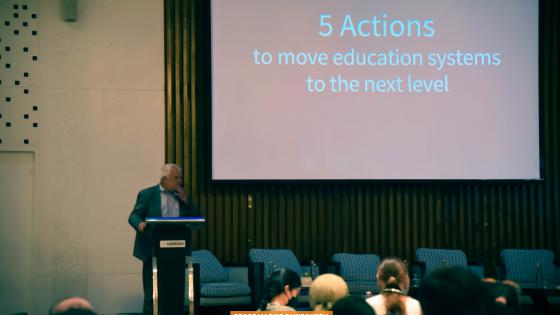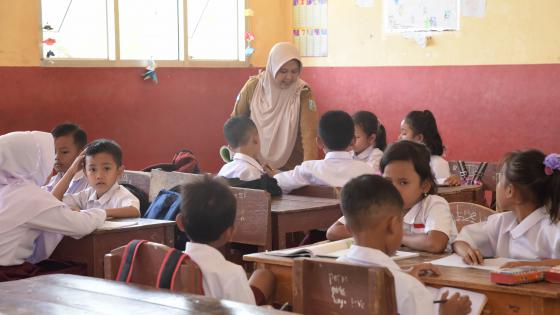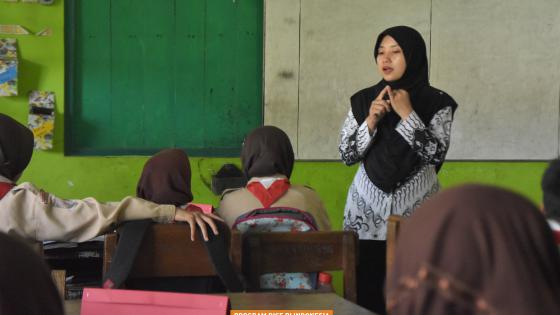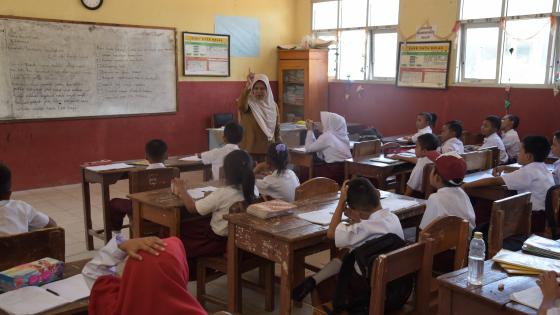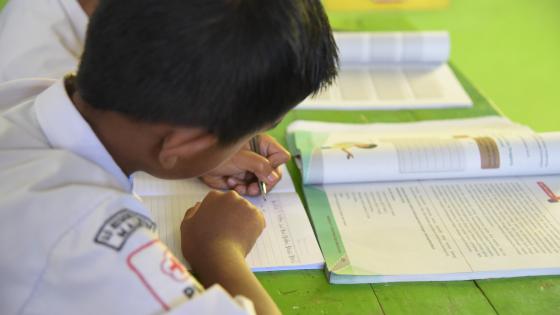Lant Pritchett delivers RISE 5 Actions at the RISE Workshop "Fighting Learning Crisis, Building Foundational Skills" which was held on 2 August 2022. Photo: Novita Eka Syaputri
The Indonesian Government has succeeded in expanding access to education. With almost all children in Indonesia now in school, how can we ensure that they receive quality learning and master the skills appropriate to their level of education? Below are five actions summarised from the RISE studies in Indonesia and other countries.
1. Commit to foundational learning
Our previous blog, "Fighting Learning Crisis, Building Foundational Skills, discussed the importance of focusing on improving students’ foundational skills (literacy and numeracy). In the policy paper published by RISE Programme, “Focus to Flourish: Five Actions to Accelerate Progress in Learning” (download here), it is emphasised that commitment to foundational learning must become a pressing political priority for change to occur so that it can be translated into budget and programme planning.
2. Measure learning regularly, reliably, and relevantly
Learning assessment is necessary not to determine students’ graduation or school quality but to understand their abilities appropriate to their education level.
At the class level, assessments are needed to see each student's learning progress. As the analysis by the RISE research team in the Learning Profile, if Indonesian children do not master basic numeracy skills in grade 6, they will most likely never master them, even if they keep going up in grades. Whereas the purpose of a good assessment is to provide information as early as possible on the quality of ongoing learning.
Source: Indonesian Family Life Survey 2000 and 2014
The tests used in the assessment must be able to compare students’ learning progress regularly rather than a final exam. Therefore, the mind-set of teachers, schools, and the government needs to shift from the previous “assessment of learning” to “assessment for learning”. At the school and district levels, assessments are essential for evaluating the education system’s performance more extensively. Thus, policymakers can determine appropriate interventions to help students learn and achieve the education goals.
3. Align systems around learning commitments
The goals of the education system can only be achieved if all elements are aligned and work toward the same purpose or commitment. The alignment of elements in the education system must occur at all levels, from policies at the central, regional, to class levels. For example, when Indonesia committed to increasing access to education in the 1970s, the government built more than 60,000 primary schools through the INPRES Primary School program. Since then, more children can go to school, and now, almost all Indonesian children can receive basic education.
At the “Media Briefing: RISE Recommendations for Fighting the Learning Crisis” (watch the recording here, the event was held in Indonesian), RISE researcher Risa Wardatun Nihayah spoke about the education system and said that alignment in the education system would increase accountability. One example is teacher recruitment in Indonesia, in which coordination overlaps. If the process is aligned, all of these elements will contribute to advancing the quality of teachers in Indonesia, starting from the recruitment system. However, the role of politicians and other elements within the education system in driving quality improvements in teacher recruitment is yet to be seen.
Source: RISE framework.
Indonesia is currently facing the challenge of low-quality education, as reflected in its low mastery of foundational skills. All elements in the education system need to collectively focus on goals or commitments to address these problems. In teacher education programme, for example, the curriculum needs to equip prospective teachers with the knowledge to teach literacy and numeracy. When recruiting teachers, the shared goal must be to recruit teachers of good quality or competent teaching. RISE study on teacher recruitment found that teacher recruitment is yet to be oriented towards screening quality teachers. The analysis shows a misalignment of commitments among the parties involved in the recruitment process. The division of authority among the institutions involved in the teacher recruitment process—the Ministry of Administrative and Bureaucratic Reform, the Ministry of Education and Culture, the Ministry of Finance, and local governments—overlaps. Each institution seems to have its own purpose, leading to dissatisfactory recruitment results. This misalignment has contributed to the low performance of teachers in Indonesia.
Source: Teacher Recruitment in Indonesia: Institutional and Social Dysfunctions (2020)
The RISE study examining educational innovation at the district level found an example of a local education system in which all elements are aligned. In the City of Yogyakarta, the district head is strongly committed to the quality of education. Along with the bureaucrats, the district head listens to stakeholders’ input and takes them into consideration to provide the best service to improve the quality of education in his region. In addition, there are educational innovations in Yogyakarta that were initiated by the community and then ratified as local policies. The people’s strong trust in their local leaders and their staff has made them actively put into practice policies aimed at improving the quality of education. RISE researchers presented the study’s result to education stakeholders in Yogyakarta and its surrounding districts at the workshop “Learning from Education Policy Innovation in Yogyakarta” (find the presentation materials here).
4. Support teaching
Teachers need sufficient knowledge and support to teach effectively. The provision begins when prospective teachers attend a teacher education programme, during the pre-service training, and throughout their tenure (in-service years). Quality teachers are those who are able to practice effective teaching. Therefore, to prepare and retain quality teachers, this support must be sustainable so that they will continuously teach effectively throughout their careers.
But a RISE study that evaluated a teacher training programme found that graduates of the pre-service Teacher Professional Education (PPG) (check out our infographic "Updates on the Results of Pre-Service Teacher Professional Education (PPG) Programme Evaluation Study") felt that the knowledge they gained from the programme was too theoretical and did not help them face the challenges of teaching in the classroom. The teacher education programme also did not provide sufficient provision for prospective teachers to teach literacy and numeracy. As revealed in many assessments, the low mastery of foundational skills among Indonesian children is the root cause of the low learning outcomes of Indonesian students over the years.
Therefore, teacher education programmes need to focus more on equipping prospective teachers with knowledge of effective teaching methods, particularly in teaching literacy and numeracy. Thus, a teacher does not just convey learning material to students. The support given to teachers should be adjusted to their level of competence. For example, support for novice teachers is certainly different from the support needed by in-service teachers. Novice teachers need proper induction while navigating the transition period from being a prospective teacher to a teacher who teaches in an actual classroom. Meanwhile, in-service teachers who have taught for many years, with a higher level of competence, need to develop their teaching skills to suit the changing times or the problems encountered in the classroom.
Teachers are often to blame for the low student learning outcomes, despite the fact that the existing education system has not provided proper support for them to teach properly and effectively. Teachers are often left bewildered by the unaligned components. Take, for example, the curriculum and the textbooks that are essential for teachers in teaching but are inadequate to help teachers teach literacy and numeracy effectively.
The first page of the grade 1 primary school textbook immediately presents a text (as if expecting students are already able to read), while the introduction to letters is on page 12. Source: RISE workshop “Fighting Learning Crisis, Building Foundational Skills” (2022).
The policy paper “Focus to Flourish: Five Actions to Accelerate Progress in Learning” (download here) proposes two undertakings for policymakers to create an ecosystem supportive of teachers to teach effectively:
- Refocus professional development on the craft of teaching
- Reform teacher careers to attract, retain, and motivate quality teaching (watch RISE video on “Teacher Career Path under the Indonesian Education System”)
5. Adapt what you adopt as you implement
Under a decentralised education system, education problems vary by district. With more than 514 districts, Indonesia cannot solve its education problems with a one-size-fits-all approach; different solutions are needed to address issues in each region.
The RISE study on educational innovation at the district level examined several districts to learn policy adaptation to fight the learning crisis adapted to their respective socio-cultural backgrounds. For example, in the City of Bukittinggi, some education policies stem from the active role of school principals and family participation: Peer Supervision of Teacher Performance and Family Education. There are no incentives for the implementation of these programmes, but they sustain due to a solid kinship network. Meanwhile, in Yogyakarta, the active participation of parents and the community is key in supporting learning, known as Parental Participation and Community Learning Hours. The sustainability of these programmes is driven by the tradition of collaboration in Yogyakarta: handarbeni and guyub rukun.
However, RISE study also found that many district governments lack the capacity to design educational policy innovations in their regions. They need support in adapting policies to suit their local context. The central government needs to map areas requiring special assistance to help them establish policies that focus on improving the quality of learning. Local governments can also collaborate with other elements of society, such as grassroots organizations and the private sector, in designing and implementing educational innovations.
Let’s help RISE disseminate these 5 Actions to education policymakers and stakeholders so we can fight learning crisis together! Visit bit.ly/RISE5Actions to know more about this campaign.


